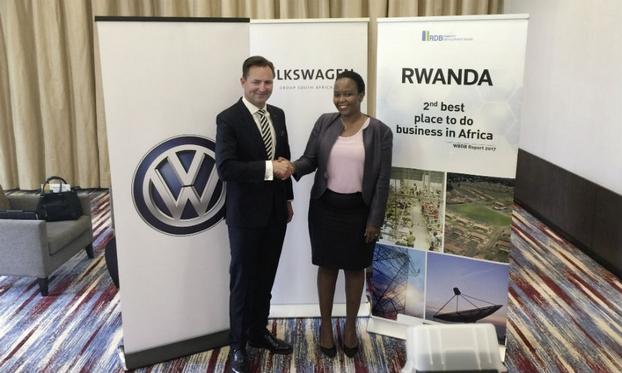Volkswagen, the German carmaker is set to launch a car sharing service in the capital city of Kigali with around 150 vehicles from the Volkswagen brand, this year, the company announced in a statement on Thursday.
The objective is to provide modern integrated mobility services in Africa in future and as part of its worldwide regionalization strategy, Volkswagen is planning to expand its business presence significantly in Sub-Saharan Africa.
Agreements to that effect were signed in Kigali just over a year ago in the presence of Rwanda’s President Paul Kagame and Dr. Herbert Diess, CEO of the Volkswagen brand.
The brand will be focusing in particular on new App-based mobility services such as car sharing and ride hailing in Rwanda.
In addition, a ride hailing service with some 150 vehicles is scheduled to start during the course of this year. These figures are derived from expected market acceptance of these innovative mobility services that are completely new to Rwanda. Further services of this kind are planned for the coming months, the company said.
The vehicle fleet required for the planned mobility solutions is to be taken entirely from local production and an environmentally-compatible local vehicle assembly facility is to be established in the capital Kigali.
Production will start with several hundred vehicles in mid-2018, and capacity will gradually be expanded to up to 5,000 vehicles per year. It is planned to initially build the Volkswagen Polo and Passat models.
Furthermore, a local start-up is developing the programming for the mobility app. Overall, Volkswagen and its partner companies will create up to 1,000 jobs in Rwanda.
The financial engagement amounts to approx. USD 20 million (approx. €16 million) toward developing the assembly plant and ride-hailing service.
“Rwanda is a young, modern and digital country – so it is ideally suited to new connected mobility services. I am convinced our customers will respond positively to the envisaged business ideas”, said Thomas Schäefer, Chairman and Managing Director of Volkswagen Group South Africa and responsible for the Sub-Sahara region comprising 49 countries with a total population of some 920 million.
“We hope to put the valuable experience gained with ride hailing here in Rwanda to use in other markets where the Volkswagen brand has a presence,” he added.
He said Volkswagen’s commitment to Rwanda also includes the training of local people and the possibility of cooperation for the establishment of a technical academy is being investigated together with other German companies.
In the long term, the objective is to generate employment, know-how transfer and sustainable growth.
With the integrated mobility concept, Volkswagen intends to provide a new impetus for the development of individual mobility.
Schäefer said the automaker is trying to encourage East African drivers to buy new cars instead of second-hand imports. “We are trying to break this thought-pattern that Africa is poor; they can’t afford (new) cars,” he said.
Production will start with several hundred vehicles in mid-2018, and capacity will gradually be expanded to up to 5,000 a year, VW said.
In addition to Rwanda, the Volkswagen brand is also active at three other locations in the Sub-Sahara region: the company has been manufacturing vehicles in South Africa since 1951. Vehicle assembly began in Nigeria in 2015, and in Kenya in December 2016.









